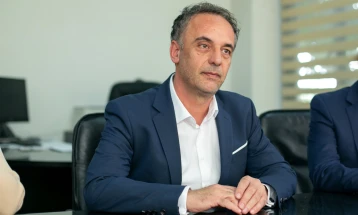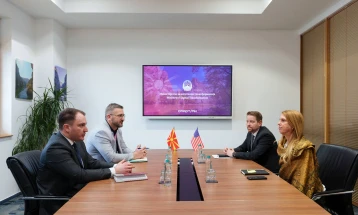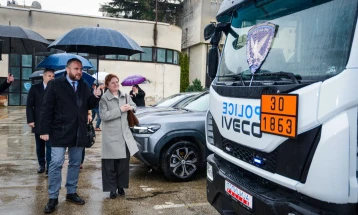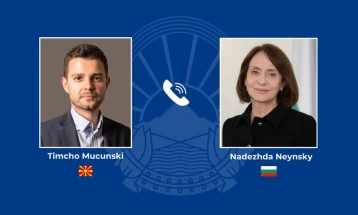GROM’s Andonovska: Faulty personnel policies led to devastating results, party prefers to remain in opposition if we disagree with general policies
- GROM’s vice president Dobrila Andonovska, list principal in the first electoral district nominated by the Brave for Macedonia coalition, tells MIA in an interview that if she is elected member of Parliament, she’ll focus on reforming healthcare, education and social reforms. Healthcare should undergo radical reforms, she stresses.
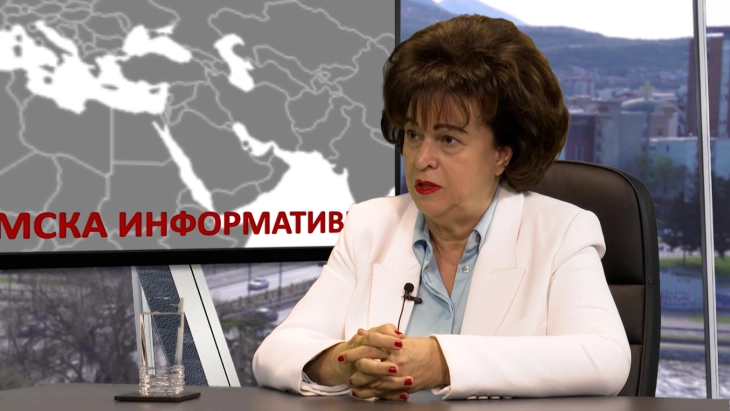
Skopje, 25 April 2024 (MIA) – GROM’s vice president Dobrila Andonovska, list principal in the first electoral district nominated by the Brave for Macedonia coalition, tells MIA in an interview that if she is elected member of Parliament, she’ll focus on reforming healthcare, education and social reforms. Healthcare should undergo radical reforms, she stresses, and the human capital is where we should start, including medical students.
Asked who is GROM’s preferred coalition partner – SDSM or VMRO-DPMNE – Andonovska says her party will prefer to be in opposition if it disagrees with the general policies. On the proposal of the head of state to be elected in Parliament with two-third majority, she says it’s not a good proposal, because “the citizens are those that should decide who’ll be president, not the parties.”
On GROM leader Stevcho Jakimovski being blacklisted by the US authorities and how it has affected the party’s members, Andonovska says that it is not an easy matter, but it has brought the members closer.
She stresses that the party and the coalition don’t support constitutional changes calling the opening of the Constitution “Pandora’s box.”
“Wishes are obviously being put toward, including the wish for the president of the state to be elected in the Macedonian Parliament, and we don’t know what the next wish will be. Outright no for the opening of the Constitution and the inclusion of the Bulgarians because this package won’t be ever closed completely as regards our nation and as regards the Macedonian language. My party and the coalition has nothing against the Bulgarians, we have nothing against those who should be included, but we think it should be in a package. We are in favor of Europe. Let those who should make an agreement sit down and come to an agreement that it should be a closed package. Then, we wouldn’t see it as a problem, however we also don’t accept this condition – the blackmail by the Albanian bloc of parties,” Andonovska says in an interview with MIA.
Andonovska, who is a doctor, says she has detected the burning issues and weaknesses in the healthcare system, especially during the Covid crisis.
“As a medical professional with 35 years of experience in both the public and private healthcare, I personally think that during the Covid crisis, the main mistake that had been made by the then authorities, although I acknowledge they’d made utmost efforts, was that they couldn’t join the private healthcare with the public healthcare. It is a huge mistake and the consequences included lives lost… Back then we’d maintained two parallel systems – private and public healthcare. We know it had let to huge costs of the citizens, starting from the labs to the private hospitals,” notes Andonovska.
As a result, she proposes amendments saying that healthcare must be “one and only”.
“We have exceptionally experienced medical professionals, doctors and nurses. What’s missing is good organization, to respect the hierarchy and to value qualities, such as education, experience and skills. This is what’s missing. We cannot afford to have [health] ministers who are replaced once a year or once in six months. We cannot afford to have hospital directors, who should be revered by the employees and the patients, and who should be skilled managers, that are fired and replaced every six months… Unfortunate policies involving managers lead to devastating results. Also, whenever a project or an investment is launched in the healthcare, the recently appointed officials cancel the projects and start anew. This is going on in all spheres of the society and I think it’s unacceptable,” states Andonovska.
In reforming the healthcare system, she says she would begin first with the human capital noting that more attention should be paid when issuing accreditations to medical faculties.
“Where would I begin when reforming the healthcare? I’d start first with the human capital, including medical students. The country has several medical faculties. I think we should be very careful with the issuance of accreditations of faculties and universities, especially with medical schools. We have excellent professors of medicine, but I’m not sure it is used as it should in the education of young doctors. The status of private resident doctors is a topical issue for years, especially in recent weeks. I have to admit that during Minister [Venko] Filipche’s term, for the first time they were approved a monthly salary of 26,000 denars, however they don’t have health insurance. It’s unacceptable private resident doctors, who are self-financed, not to have health insurance all the while they have the same obligations at work in the hospitals. Some 400 private resident doctors, who have been protesting, are in this unfortunate situation,” Andonovska tells MIA.
She also points out an issue with the medical professionals being involved in political parties.

“It is very rare medical professionals, especially doctors, not to be actively involved in parties. Active involvement in parties, both ruling and opposition, has caused a divide in the healthcare, because all the parties have been employing their members en masse. At the moment, there are 400 private resident doctors and we’re doing nothing to keep them here. There are 350 doctors who are registered in the Employment Agency, including some 50 in Skopje. They are waiting for someone to solve their problem, to be offered a job in order to stay here, in the country,” says Andonovska.
She calls on the future health minister to set up a team of highly qualified professionals who are not members of any party. “We have to make a change. Mistakes are no longer acceptable after being an independent country for 33 years,” she says.
She does not agree with Foreign Minister Bujar Osmani’s statement that the country should exit the Open Balkan initiative, adding that it is primarily because of the migration of medical staff.
“Absolutely not, especially not in this transitional phase, with the European Union accession we expect, hopefully the sooner the better, so that we don't live in an in-between space. It is a good initiative not only for the economy - trade, customs, etc. ., faster movement, transport, and it is absolutely important for healthcare as well. Why not have staff circulation in terms of deficient staff. My point is, at least their stay will be legalized,” Andonovska says.

She adds that doctors and specialists from several countries "roam" in the region, not only from the Balkans, but also from other countries, as they are not licensed here, urging the future government to deal with this issue.
Regarding the upcoming parliamentary elections, and whether the party expects to enter the Parliament, given that the current electoral model is not favorable for the smaller parties, Andonovska believes that this model, which favors the larger parties, will not be changed for a long time.
“It is absolutely not favorable. It only suits the larger parties. Some of the smaller parties that now have their own MPs stated in the previous elections that they are short of MP mandates precisely because it is not an electoral model with a single election district. I believe that this model will not be changed for a long time because it is always dictated by the larger parties, which is not democratic, above all. Yes, we expect to have our MPs. I would not like to speculate on the number because as parties in this coalition we are not large, but we have a large group of supporters both in terms of the parties and our leadership and in terms of the policies that we have been pursuing for years, and this is an opportunity to say how we would act further. So yes, we do expect that, and the number depends on the voters who will give us their trust. I hope we will be a significant factor in making major decisions and being part of the executive power and decision-making. However, not at any cost,” says Andonovska.
In response to MIA’s question on whether they would rather join a coalition with SDSM or with VMRO-DPMNE, she says they would join those who will not support constitutional amendments under the current terms.
“If there are certain modifications so that what we are asking for is fulfilled in order to close the whole package, then we would join a coalition, but we prefer to remain in opposition if we do not agree with the general policies,” Andonovska stressed.
Commenting on the ethnic Albanian parties’ request that the President be elected in Parliament with a two-thirds majority, Andonovska says it is not a good idea because it is the citizens who should decide on the country’s President, not the parties.

As regards the United State’s decision to blacklist GROM leader Stevcho Jakimovski and how it has affected the party, Andonovska says the situation was not easy, yet it has further brought party members together.
“It is worth noting that it further brought the party members together. The situation is not easy. However, when conscience is clear, support is greater than before. Blacklists are something else entirely. They ban entry in a certain country, other countries also have them right, not only our strategic partner, and they ban business operations. First of all, our Constitution does not allow what some politicians wanted to impose in relation to the law - changes, it is first of all unconstitutional. If we look at the laws in place with our strategic partner, we know that the presidential candidate Trump for instance, can both announce a presidential bid and face a prison sentence. So, their laws are completely different, and we have our own laws which are also correct and it should absolutely not reflect on the mood among citizens,” Andonovska tells MIA.
Neda Dimova Prokikj
Translated by Bisera Altiparmakova - Marusic and Nevenka Nikolikj
Photo: MIA
Video: Andrej Brankovikj and Vladimir Rabasovikj


